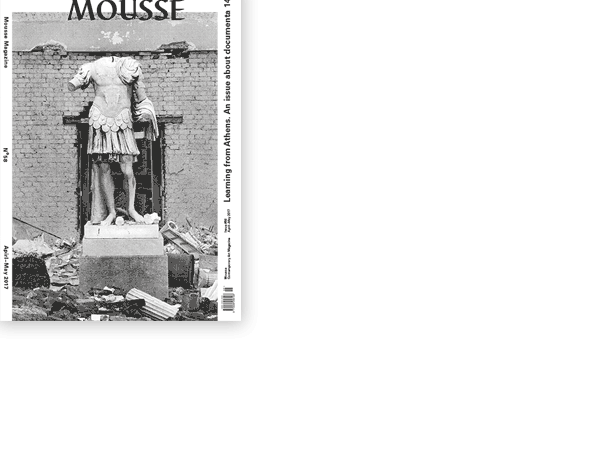Mousse #58
April–May 2017
www.moussemagazine.it
Facebook / Twitter / Pinterest / Instagram
Get issue #58 or subscribe
iPad edition #58 and subscription available soon on Apple Newsstand
A special documenta 14 issue:
Kirsty Bell on exchange: documenta will occupy Athens’s National Museum of Contemporary Art, while the Fridericianum will be given over to EMST’s permanent collection.
Dieter Roelstraete reports on documenta’s two-state solution. He offers a history of German–Greek relations, from Johann Winckelmann to Adam Szymczyk.
Perhaps a trite question: Is the past always the future? Or: is the future always already the past? An essay by Neni Panourgiá.
Olu Oguibe explains to Bonaventure Soh Bejeng Ndikung his love for abstraction, a constant in his production: from his interest in games, to his painting, to his study of African patterns.
In 2016 Moyra Davey visited Kolkata with Quinn Latimer and Adam Szymczyk. She and Latimer subsequently exchanged letters about her new work as well as issues of precarity, writing, and shame.
Alarm goes off. Cup of coffee. A few emails. Shower. Out the door. Stefan Benchoam embarks on a road trip to the house of Elisabeth Wild and Vivian Suter.
Roee Rosen‘s work deals primarily with representations of desire and violence: an artistic universe that undermines the implications of identities. In conversation with Hila Peleg.
The public programs at documenta are not a side event, but a fundamental device, and a feminist and antifascist front: Paul B. Preciado and Georgia Sagri in conversation.
Rasheed Araeen has long questioned the art world’s fixation on Western artistic histories and discourses. An interview by Jens Hoffmann, and a reprint of the first issue of his publication Black Phoenix.
We come into contact with the features of a thing by testing it before seeing it. This establishes a solidarity between people and things. Irena Haiduk integrates Yugoexport, the first Oral Corporation, into this solidarity.
It took human labor—actual sweat and blood—to produce golden coins in the former Spanish colonies of the New World. Antonio Vega Macotela and Adam Kleinman in conversation.
Some of the more outstanding contributions to the current state of moving images have happened at the crossroads of visual anthropology, documentary, and experimental film. Ben Russell in conversation with Filipa Ramos.
Candice Hopkins talks to Joar Nango, an architect turned artist, about the revolutionary potential of Indigenous languages and the qualities of nomadic architecture as practiced in the arctic and subarctic regions of Sami territory.
As Preah Konlong, Khvay Samnang‘s commission for documenta 14, takes exhibition form, Erin Gleeson assembles a field report of sorts about its processes of becoming and its potential meanings.
Christoph Platz talks to the artist Ross Birrell about the recent completion of Criollo—a film he made between Buenos Aires and New York—and the development of The Athens-Kassel Ride, his major project for documenta 14.
Henriette Gallus and Marta Minujín on books: Alice in Wonderland, Virginia Woolf, Peter Handke, Thomas Mann, Nausea, and so many more. What would you think of a reconstruction of the Parthenon, made exclusively of books?
Every few years, the “art world” seems to recognize that it has some deficits and shortcomings—that it is not so perfect after all. Bonaventure Soh Bejeng Ndikung on the decanonization of the museum.
Dale Harding‘s plinths with silicone reproductions of traditional Aboriginal weaponry blend in with the Athens cityscape, while his installation of silkscreen prints in Kassel suggests a private space. Hendrik Folkerts speaks with Harding about these two installations.
Aboubakar Fofana responded to the invitation to develop work for documenta 14 in Athens with a proposal entitled Ka touba Fara na yé (Africa Blessing), which involves 54 lambs receiving an indigo dye bath. Here in conversation with Monika Szewczyk.
Emeka Ogboh creolizes beer by creating a new stout with “exotic” flavored notes, in order to engage audiences in a new gustatory experience that is also a playful invitation to reframe clichéd ideas of identity. In conversation with Barbara Casavecchia.
In Wang Bing‘s Remnants, the second part of Tie Xi Qu, one shot stands out: Yanfen Jie district in the bleak frame, as the camera tracks in along with advancing footsteps, accompanied by the cameraperson’s occasional breath in the chilly coldness. By Zhang Yaxuan.
Natasha Ginwala talks to Naeem Mohaiemen about his practice as an artist and how writer protagonists figure as a means of mobilizing inquiries into the fabric of “global history” (after Samuel Moyn) to build a meta-archive.
In the last twenty years, quite a few exhibitions dedicated to Greek artistic production of the 1970s have taken place in Greece. Why? An essay by Daphne Vitali on Bia Davou on an era of creative experimentation.
“Things are looking up? Huh?” asks Alan Bishop, maverick underground musician, of a camel resident of the Cairo zoo. The dialogue is interrupted as a formation of military planes flies over the city. Marina Gioti in conversation with Marina Fokidis.
Listening seems as permeable an act as sound itself—always changing, never twice the same—and it registers with many parts of the human self. Listening is one of the key concerns of documenta 14. A text by Paolo Thorsen-Nagel.
The feminist Nicole-Claude Mathieu theorized in the 1970s the notions of the “third sex” and the “third gender.” Pierre Bal-Blanc in conversation with Prinz Gholam, Marie Cool Fabio Balducci, and Annie Vigier & Franck Apertet (Les gens d’Uterpan).
Buy Mousse #58
Daily blog
Subscribe to our newsletter
Books by Mousse Publishing
Film & video on vdrome.org
